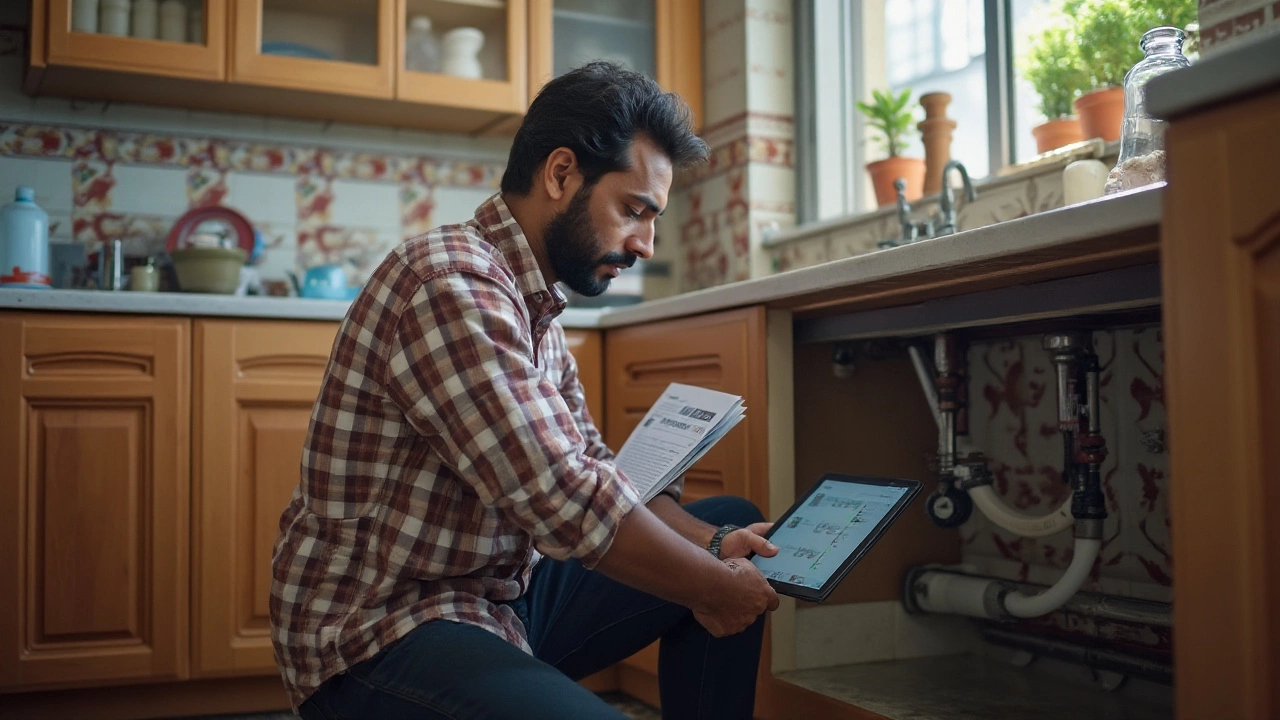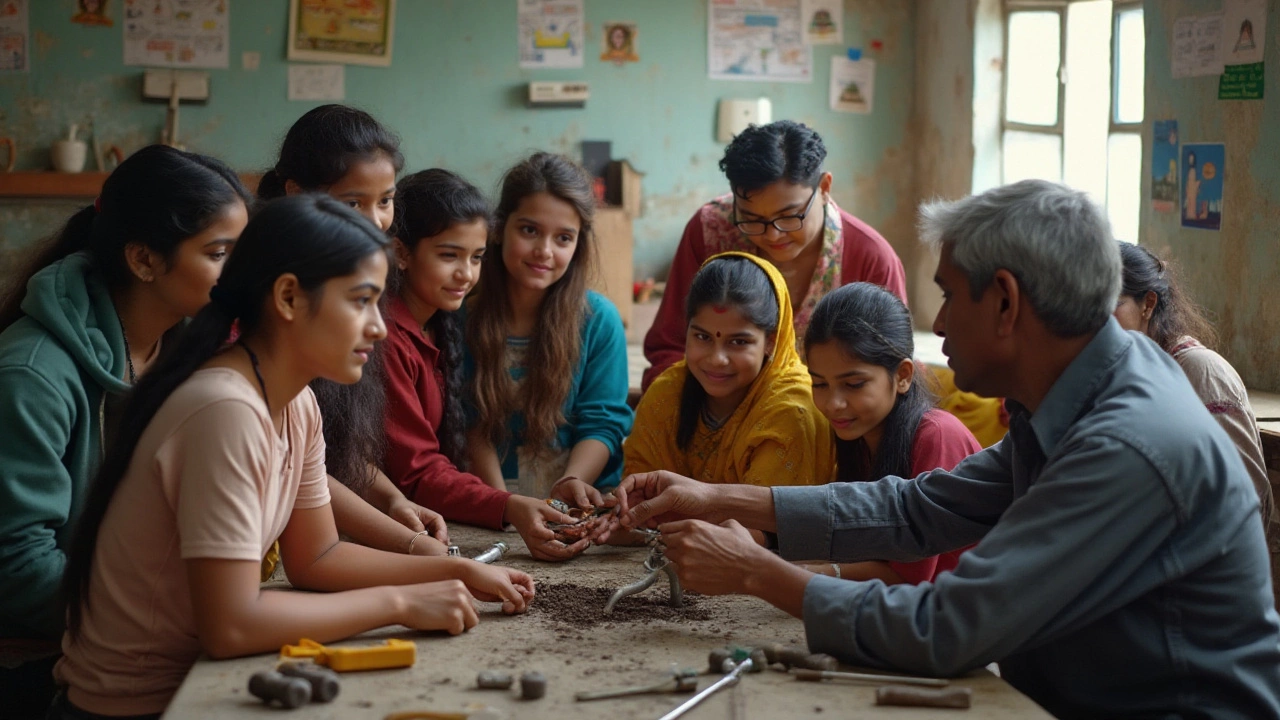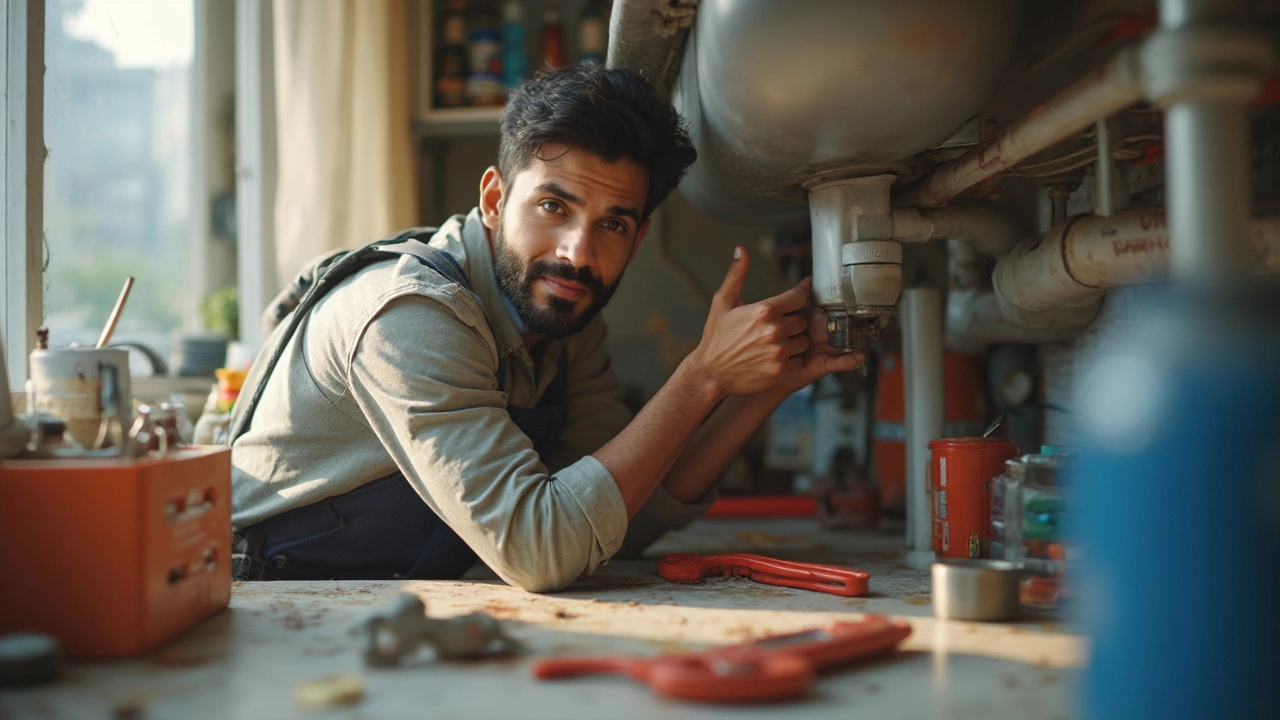In the realm of home improvement, plumbing stands as a vital trade but often perceived as a complex domain, reserved only for seasoned professionals. However, the question arises—can one truly become a self-taught plumber? In this modern age of abundant resources, the answer might surprise you.
With some determination and a thirst for hands-on learning, even you can embark on this intriguing journey. Dive into the art of plumbing, discover the essential skills one needs to hone, and explore the wealth of resources at your disposal. Whether you're interested in tackling minor leaks or envisioning grand DIY projects, this guide sheds light on the path forward.
Roll up your sleeves, familiarize yourself with the foundational knowledge, and who knows—with time and practice, solving plumbing woes might just become your newfound skill.
- Understanding Plumbing Basics
- Essential Skills and Tools
- Resources for Learning Plumbing
- Common Challenges and How to Overcome Them
- Tips for Practical Plumbing Success
Understanding Plumbing Basics
Plumbing is an age-old trade, pivotal to the comfort and functionality of modern living, yet often shrouded in mystery to those outside the profession. To become proficient, it's crucial to grasp the fundamentals which revolve around a network of pipes, valves, and drainage systems. At its core, plumbing involves understanding the water supply and drainage systems—how water enters a household, is distributed throughout, and how it exits, carrying waste away safely.
For someone stepping into the world of DIY and hoping to become a self-taught plumber, recognizing the hierarchy within a plumbing system is paramount. The system branches into two primary components—the water supply system that brings fresh water in, and the drainage system responsible for wastewater removal. Any failure in these systems can lead to significant inconveniences or damage.
“Plumbing is not just a discipline; it's an art rendered through science, mechanics, and for those with an ear for its nuances, even acoustics and physics,” said Bob Vila, a respected name in the home improvement industry.
Every plumbing system starts at the water meter, transitioning through numerous pipes and joints to service different fixtures. The choice of materials in these systems, such as copper, PVC, or PEX piping, impacts the system's durability and efficiency. Aspiring enthusiasts should not only familiarize themselves with these materials but also the tools of the trade like pipe wrenches, plumb bobs, and pipe cutters. Knowledge of these basics can empower beginners to handle simple plumbing tasks like fixing leaks or unclogging drains.
A meticulous understanding of plumbing skills begins with hand-on practice. The internet today provides high-quality tutorials, some crafted by experienced plumbers, detailing everything from installing a new sink to troubleshooting water heater problems. Despite the availability of tutorials, practical exposure is unmatched. One shouldn't hesitate to incorporate acquired skills into everyday scenarios, as practicing repairs on minor plumbing issues can help deepen one's familiarity with plumbing systems.
| Component | Function |
|---|---|
| Water Supply Pipes | Deliver water to various fixtures |
| Drainage Pipes | Remove wastewater and prevent sewer gases from entering the home |
However, there's a learning curve—common challenges include water pressure irregularities and pipe blockages. To navigate these, patience and persistence play as significant roles as technique. Recognizing when a problem is beyond home-bound solutions and needs professional intervention is crucial. Missteps can lead to costly damages, turning learning into a financially-draining endeavor rather than a money-saving hobby.
Essential Skills and Tools
Diving into the world of plumbing requires more than just a wrench and intuitive thinking. Aspiring to be a self-taught plumber demands mastering a set of fundamental skills and gathering a collection of essential tools. Not only is this exciting, but it's also a deeply rewarding endeavor. At its core, plumbing is about understanding the meticulous network of pipes, valves, and fixtures that carry water throughout structures. One must first grasp the blueprint of this complicated system, learning to read and interpret plumbing blueprints and diagrams. This is not only crucial for repairs but even more so for new installations and modifications.
Having a keen eye for detail can make marking and measuring distances between fixtures less of a headache. Accuracy is critical in plumbing, as even a slight miscalculation can lead to significant issues such as leaks or pressure problems. Developing problem-solving skills is paramount, considering that diagnosing issues accurately can be more challenging than fixing them. It involves understanding how water and heating systems work, identifying which valve to turn off when a major problem arises, and distinguishing the myriad of noises and their meanings.
Another indispensable skill in the plumbing profession is hand dexterity. From handling tiny nuts and bolts to maneuvering large pipes, being able to work with your hands in tight spaces, and perhaps even awkward positions, is beneficial. With modern advancements, knowledge of electronic systems and smart water technologies is also becoming ever more relevant. Now let's talk about tools since they fit hand-in-glove with the skills. Basic tools every plumber should arm themselves with include a pipe wrench, pliers, a hacksaw, and a spirit level. Well-maintained tools lead to greater precision and reliability in work. An experienced plumber, a mentor of mine once said,
'Tools are not just implements; they are extensions of your hand and mind. Treat them well and they’ll show you what they’re capable of.'
For more advanced plumbing work, a power drill, hole saw kit, and propane torch could become essential. Safety gear like goggles and gloves are vital to ensure personal safety, especially since you'll be dealing with sharp tools and sometimes harmful substances. Investing in a quality plumber's snake can also save you multiple trips to the hardware store. Interestingly, according to a survey conducted by the Plumbing Institute, nearly 76% of DIY plumbers credit having the right tools as their top confidence booster.
Emphasizing these skills and acquiring the corresponding tools set a solid foundation in your plumbing journey. It not only opens the door to tackling more complex tasks but also builds the confidence to experiment and innovate. The path to becoming a DIY plumber is both a thrilling challenge and an empowering skill set. With dedication and enthusiasm, the learning curve becomes less daunting, inviting individuals to turn everyday plumbing tasks into a passion and possibly a profession.

Resources for Learning Plumbing
When venturing into the world of DIY plumbing, a treasure trove of resources awaits to assist you. First, the internet is a colossal warehouse of information, offering diverse channels to absorb plumbing knowledge. Online platforms like YouTube provide detailed video tutorials that cater to all levels of expertise. Whether you're trying to fix a leaky faucet or installing an entirely new system, creators share their insights and experiences, making it easier to visualize and understand the intricacies. Websites like DIY Network and Family Handyman have countless articles, step-by-step guides, and photographs that transform complex tasks into manageable projects.
Books remain an invaluable resource for those who favor more structured learning. Several comprehensive texts cover foundational theories and advanced techniques, offering a chance to delve into the subject at your own pace. Titles such as 'Black & Decker The Complete Guide to Plumbing' and 'Plumbing 1-2-3' by The Home Depot are highly recommended. These books combine clear instructions with vivid illustrations, making them accessible to beginners while being detailed enough for those looking to refine existing skills.
Local community colleges and trade schools are excellent places to consider if you prefer more formal pathways. Many institutions offer certification courses, enabling you to receive hands-on training under the supervision of experienced professionals. These courses add a structured learning environment to your repertoire, proving beneficial when tackling more significant and intricate plumbing projects. Moreover, connecting with fellow learners can forge valuable relationships, enhancing your confidence and skills as you share and collaborate on projects.
"Knowledge is empowerment. Embrace every opportunity to learn, and your skills will grow beyond what you ever imagined." - Alireza Hassani, Renowned Plumber and Author
Additionally, online forums and communities like Reddit’s r/Plumbing or the Plbg.com forums serve as an open platform to connect with both novice and seasoned plumbers alike. They enable the sharing of ideas, creative solutions, and troubleshooting advice, making them an invaluable addition to your learning resources. Participation in such forums can provide real-time assistance when facing specific plumbing challenges, enhancing your understanding of the craft.
Common Challenges and How to Overcome Them
Embarking on the journey to become a self-taught plumber can be incredibly rewarding, yet it isn’t devoid of its hurdles. Among the most prominent challenges is understanding the intricate nuances of plumbing systems. When approaching a new plumbing issue, it often feels like deciphering a complex puzzle. The various pipes, fixtures, and their interconnections can overwhelm a beginner. However, breaking down the plumbing system into smaller, manageable sections and studying each component individually can aid in grasping how it all fits together.
Access to hands-on experience is another significant challenge. Plumbing is not a skill that can be learned merely through reading or watching videos. It requires getting your hands dirty and playing detective to troubleshoot real-world problems. Beginners should consider working on small-scale DIY projects around their homes to gain practical knowledge or offer assistance to friends or family. As they gain confidence, they can gradually tackle more intricate tasks. Knowledge sharing platforms and community boards also provide invaluable opportunities to learn from seasoned professionals. Here, sharing tips, asking questions, and learning from others’ experiences enrich the learning process.
Another hurdle is the ever-evolving nature of plumbing technology and standards. Regulations on plumbing practices can change, and new technologies continuously emerge. Staying updated with these trends is crucial. Aspiring plumbers should consider subscribing to trade publications and joining relevant forums or groups. They could attend workshops or online courses offered by experts to enhance their knowledge. Quoting industry insights, a renowned plumber once said,
“Staying curious and committed to continual learning is what differentiates a good plumber from a great one.”
Safety is also an aspect that self-taught individuals need to prioritize. Plumbing involves working with water, gases, and sometimes even electricity—each with their inherent risks. Enthusiasts must equip themselves with the right protective tools and adhere strictly to safety protocols. A mistake can be costly, so exercising caution ensures that you protect yourself and the integrity of your plumbing systems. Additionally, self-taught individuals might face legal challenges as several regions require certification to perform certain plumbing tasks. This barrier can be navigated by thoroughly researching local regulations and possibly working under the supervision of a licensed professional for tasks that demand it.
In conclusion, while the path may be riddled with hurdles, with determination and the right strategies, one can not only conquer these challenges but also thrive in the field of plumbing. It's all about striking the right balance between theoretical knowledge and practical application, remaining engaged with ongoing developments, and constantly pushing the boundaries of one's self-taught capabilities.

Tips for Practical Plumbing Success
Embarking on a self-taught plumbing journey can be both rewarding and challenging. There are several key tips that can significantly enhance your success as a budding self-taught plumber. First and foremost, always prioritize safety and proper planning before commencing any plumbing work. Familiarize yourself with the layout of the plumbing system you wish to work on, taking note of the location of shut-off valves and pressure points. Remember, adequate preparation is the cornerstone of any successful DIY plumbing project. Working without a well-thought-out plan can lead to costly mishaps and unnecessary frustration.
Engage with a thriving community of DIY enthusiasts and professional plumbers, as this can provide valuable insights and support. Many online forums and local workshops offer platforms to ask questions and share tips. This connection can prove invaluable, especially when tackling unfamiliar problems. In fact, seasoned plumbers often say, "No matter how much you learn on your own, never underestimate the power of a collective brain."
Certainly, joining the right community can bridge the gap between knowledge and practical application.Such networks can also keep you updated on the latest trends and tools which are constantly evolving in the plumbing industry.
Next, it's crucial to invest in high-quality plumbing tools. While it might be tempting to opt for cheaper alternatives, investing in durable, high-grade tools can save you both time and money in the long run. A reliable wrench, a variety of pliers, and a robust plunger should be staples in your toolkit. Make sure to maintain your tools well, keeping them clean and in good condition to ensure they perform effectively when called upon. Proper tool maintenance can extend their lifespan and improve their efficiency, a fact often overlooked by many novices.
Another essential tip is to cultivate patience and resilience. Plumbing is a skill honed over time, requiring practice to master. Initial setbacks should be seen as learning opportunities rather than failures. Remember, many professional plumbers took years to reach their level of expertise. Documenting your projects and reflecting on your successes and mistakes can help track your progress and boost confidence as you improve. According to the U.S. Bureau of Labor Statistics, plumbers earn a median pay of $57,770 per year, illustrating the financial viability of the trade once skills are thoroughly developed.
Lastly, never hesitate to seek professional help when necessary. While self-help is admirable, there are situations best left to certified professionals, especially when dealing with complex plumbing issues that could pose significant risks if mishandled. Striking the right balance between do-it-yourself spirit and professional intervention is crucial for both your safety and the integrity of your plumbing system. Remember, being a successful self-taught plumber doesn't mean doing everything on your own but knowing when to reach out and rely on professional expertise.


